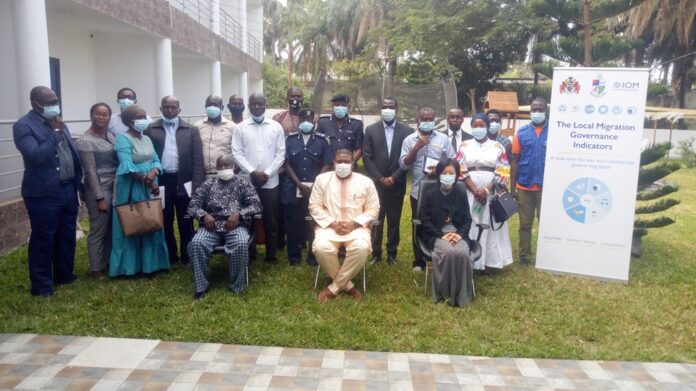By: Ndey Sowe
The International Organization for Migration (IOM) office in The Gambia on Thursday, 16 December, 2021 launched the Local Migration Governance Indicators (MGI) for the Kanifing Municipal Council (KMC) which is geared towards looking into ways local authorities oversee migration.
The event was held at a local hotel in Senegambia.
The MGI for KMC also aims to take stock of local migration strategies or initiatives in place, and identify good practices as well as areas that could be further developed. This, they believed, will foster the dialogue on migration between the national government and local authorities, enabling local authorities to learn from one another by discussing common challenges and identifying potential solutions.
Fumiko Nagano, IOM Chief of Mission, said this is an important process that is geared towards strengthening the municipality’s evidence-based migration governance, guiding KMC to be able to design a suitable system and policies to manage migration.
She added that this initiative follows and complements the MGI process at national level that the government of the Gambia has implemented over the period of one and a half year starting in 2020, during which the National Coordination Mechanism on migration (NCM) under office of the Vice President, led the process that culminated in the MGI report for the Gambia in May, 2021.
“In recent times, the role of cities and municipalities on migration governance has grown significantly given the rapid space of urbanization and the importance of cities and municipalities as transit locations and destinations for all forms of migration and displacement,” IOM Chief of Mission, Nagano indicated.
She added that in an effort to support the discussion between levels of government on migration governance, IOM has adopted a migration governance indicator to the local level to offer a more comprehensive picture of what has been done at all local levels.
“Effective migration governance is in line with the UN’s 2023-30 agenda, which highlights the positive contributions of migrants to inclusive growth and development,” Nagano disclosed.
Talib Ahmed Bensouda, Mayor of KMC, said his office in July 2021 received a letter from the IOM inviting them to the roll out of the Migration Governance Indicators initiative for the period of October, 2021 to September, 2022.
“Knowing how passionate I am to find solutions to issues affecting our youth, I requested the office of the CEO to register our interest in taking part in the process to be conducted by IOM and the Economist’s Intelligence Unit,” Mayor Bensouda disclosed.
Mr. Bensouda remarked: “It is clear that the biggest asset of our municipality is our young people. Their passion to deliver change in our city has to be supported. One of the many ways to achieve this, is to provide the enabling environment both at national and local level to allow young people to stay home and contribute to our economic growth.”
The KMC mayor said cities and municipalities, such as KMC are major sources, transit points, and destinations for migration.
“The question of how we confront the benefits and challenges of migration should be of interest to all of us. At the KMC, we are committed to providing young people with meaningful social and economic opportunities and as a council we are hopeful that the process will help us to take stock of the migration initiatives, assess our strengths and weaknesses to design effective policies that will help address migration challenges in our municipality,” Mayor Bensouda assured.




















